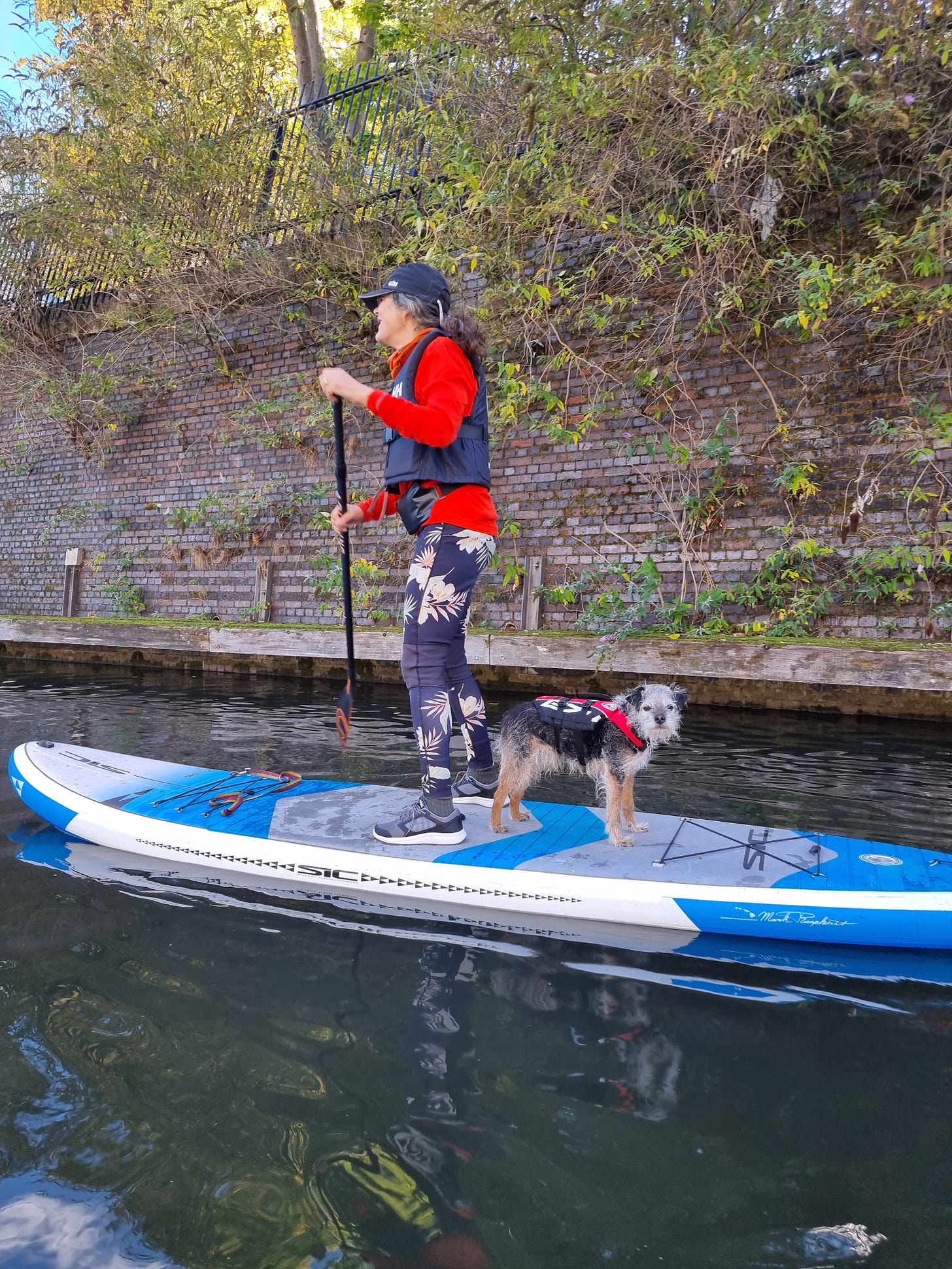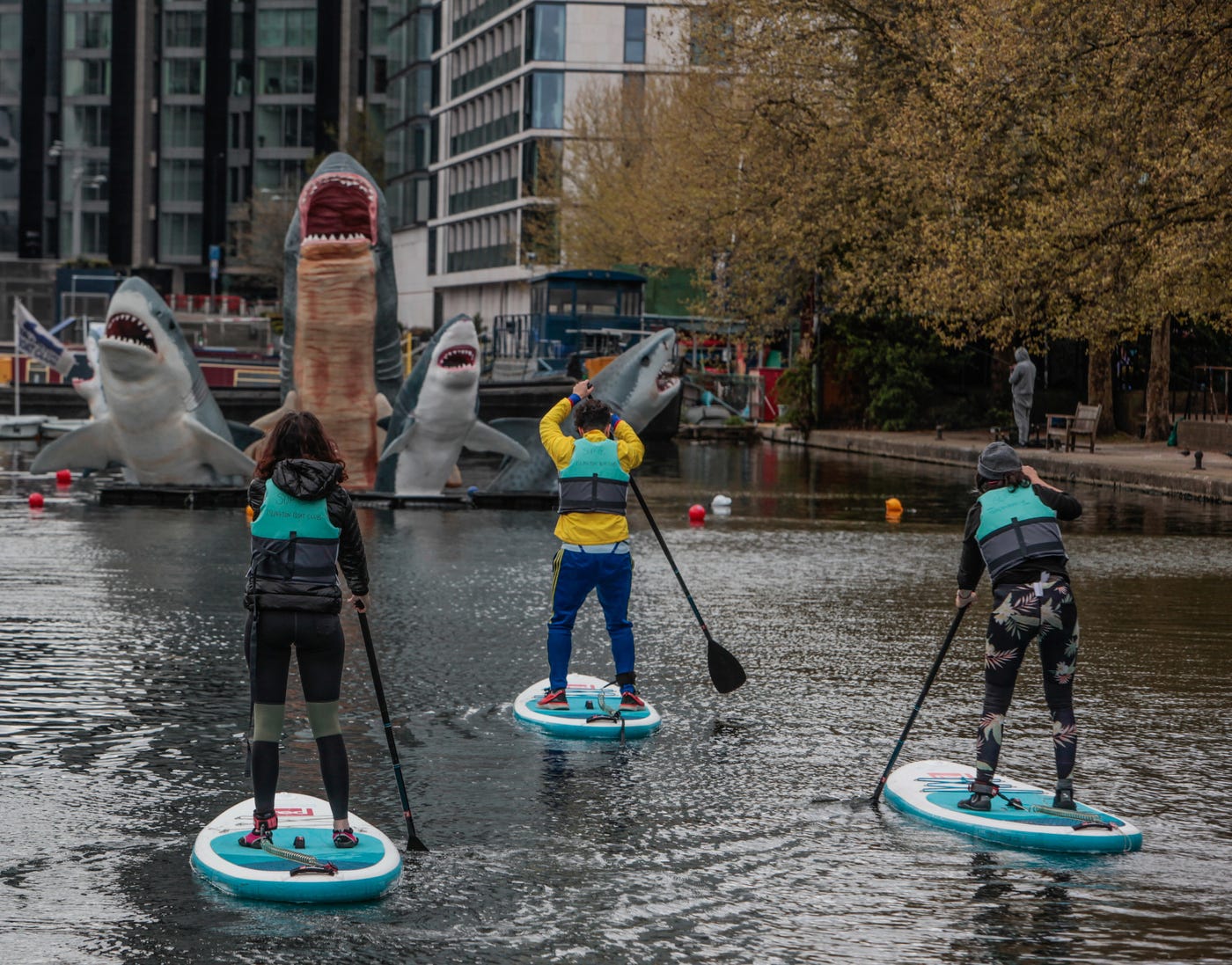What's wrong with paddleboarding?
Paddleboarding is the world’s fasting growing water sport, but it has 101 weird little problems says Nicola Baird, who paradoxically loves to call herself a paddleboarder. Read on to see if you agree
1. Its name is so confusing.
You might go for a sup, or a paddle or paddleboarding or even S.U.P. It’s hard to spell too – sup is the acronym for stand-up paddleboarding, but invariably the hyphen ends up in all sorts of places. The typos are all over Instagram.
MAKE IT CHANGE: mostly said as ‘sup’ like ‘pup’. The exception is BSUPA’s acronym usually said like bee-soup-er.
2. The people.
This is a sport for the better-off and in the UK if you’re a newbie leisure paddler than you’re probably also going to be white, female and middleclass. The moment you purchase your own board you’ll soon be needing a car so you can live your best life paddling the routes mapped out in the books Paddling Britain by Lizzie Carr and Stand-up Paddleboarding in Great Britain by Jo Moseley. British Canoeing’s site has loads of useful route ideas dominated by where to park
https://gopaddling.info/
MAKE IT CHANGE: There is absolutely no reason for sup to be a rich person’s sport. Sup is on NHS prescription to improve wellbeing in Nottingham (no coincidence that this is the base for British Canoeing).
https://www.supfitness.co.uk/the-wow-project
3. It’s got a diversity problem.
At British Canoeing club level, the community clubs in big urban centres are packed with diversity, but as people progress with skills, ethnicity flattens, then disappears. Good luck to anyone who isn’t a white middle class bloke making paddling their career. The exception is sup yoga which is very much ruled by white women.
MAKE IT CHANGE: Efforts by British Canoeing to get partners to run women only sessions and their championing of this Girl Can and #shepaddles was great but then came lockdown and afterwards 50,000 new members of British Canoeing making use of the river/canal licence, insurance etc. It is highly probably that more than half of these are women. That’s an exciting change!

4. The shopping.
You can rent kit but it’s so tempting to buy a cheap board when they go on sale in the big supermarkets. Paddle regularly and soon you’ll be wanting neoprene leggings, a personal flotation device (looks like a fanny pack) and a fancy carbon paddle…
MAKE IT CHANGE: In your first year or two renting a 10.6 (ten foot six) or 10.8 board is going to be fine, but if you’re out on your own on that tempting middle aisle new board then use your sup safety kit (buoyancy aid, leash, charged phone in waterproof case). If you’re not sure ask a professional at a canoe or sup club. No one wants you to drown.
5. Instagram #sup.
Invariably images are framed by azure blue water with super fit yoga girl, mostly undressed and without any form of buoyancy aid.
MAKE IT CHANGE: Paddleboarders are now the most rescued group by the RNLI. If you go out on the sea, then make sure that you are skilled enough, know the area, have checked the tide, understand why it’s a very bad idea to paddle with an offshore wind, wear a buoyancy aid and leash, carry a phone in a waterproof case and have told someone where you are going and when you’ll be back.
6. Gender: the weird female - male split.
Women of a certain age like to learn paddleboarding, (generally the ones who aren’t into wild swimming, but it’s not quite as straightforward a divide as this).
MAKE IT CHANGE: Any age and any gender can do sup, #shecan was a British Canoeing initiative that provided paddlesport role models. Anyone under nine stone is going to find it super easy to stand and probably even move around the board. Also see the benefits Jo Moseley picks out about paddling through the menopause. https://www.jomoseley.com/writing
7. The materials.
The inflatable sups (isups) are made from “military grade” PVC. Who knows what that means but I’m going to take a guess and say it probably doesn’t recycle well. Where does a dead isup go?
MAKE IT CHANGE: Documentary film maker of STV’s Scotland: Ocean Nation and endurance sup star Cal Major can be seen paddling 800 miles around Scotland on a board which has been part of many of her trail blazing adventures, so maybe with care and repairs a sup board is a good investment.
8. The bravado.
Anyone good at sup makes it looks so easy, but even on sheltered water people get into trouble, especially if they haven’t planned their day, checked the weather or ignored safety kit advice.
MAKE IT CHANGE: Horrible entanglements and drownings will now see a QR code on boards that are sold in big, non-specialist stores that links directly to safety advice and when and how to wear a leash.

9. Damaging the planet.
Out on a sup in the middle of a canal or river you’re so in touch with nature. You’ll soon also notice the litter clogging up watercourses and may even start to regularly pick it up and recycle. But…
MAKE IT CHANGE: Paddleboard Bible author Dave Price argues that sup switches people on to the environment but a beginner with no ability to steer, or someone dealing with a challenging wind will crash into anything and especially waterbird nests or split up young duckling and gosling groups. We also interrupt fishing cormorants and herons, disturb shallow areas where fish spawn/lay eggs and by failing to clean up kit properly transfer plants, American crayfish eggs and all sorts of nasties between waterways. It might not be the fault of sup but Derwent Water in the Lake District has been taken over by New Zealand pygmy weed – that stuff is good at surviving on a scrappily cleaned board or unwashed wet suit.
10. Invisibility.
Everyone’s doing it, most people have tried it but it’s still so new that it hasn’t yet made it as an Olympic sport. Boo.
MAKE IT CHANGE: Whatever’s going to happen you’ll find it in this magazine,
https://standuppaddlemag.co.uk/
11. The obsessionists.
The ones to watch are Devon’s Marie Buchanan (competing), Lizzie Carr (first solo woman across the Channel which took her seven hours); to listen to Joe Mosley (with her Joy of Sup podcast) and Simon Hutchinson with his SUPfm podcast (now in season 5)
to get active with by picking up litter Lizzie Carr, again (Planet Patrol) and in your inbox endless endurance challenges from friends of a friend fundraising.
MAKE IT CHANGE: I love people’s paddleboarding passion, apart from the fundraising requests.
12. The splitters.
At first paddleboarding lacked clear overall direction. In the UK there are three groups championing their approaches – BSUPA (there at the start swerving off surfing), British Canoeing (the kayakers and paddlesport national governing body who have a membership that includes the right to paddle on 4,500km of UK waterways) and the international Water Skills Academy (WSA). All have pluses except you can’t expect every instructor and coach to follow two, or even three, pathways and some tour guides still may not feel the need to be qualified. Philosophically they are all rather different too… though you’ll certainly notice the number of blokes.
MAKE IT CHANGE: In December 2022, the Marine Accident Investigation Branch report into four deaths at Haverfordwest made a case for improved SUP guidance – hence British Canoeing is from Sport England’s perspective now the national governing body for Stand Up Paddleboarding in England.
13. The learning.
So many online courses for people who love being outside, on the water. As a plus some offer continued professional development (CPD) points.
MAKE IT CHANGE: Online is good but you need to practice your self-rescue more than you think. And that means getting out on the water and getting wet. Now that April’s here, it’s time to have a go!
Nicola Baird is a BC Level 3 SUP (sheltered water) coach and a BSUPA Level 2 coach who loves to be out on the water. Find her every summer Tuesday on London’s Regent’s Canal running Up Skill SUP skill sessions.



